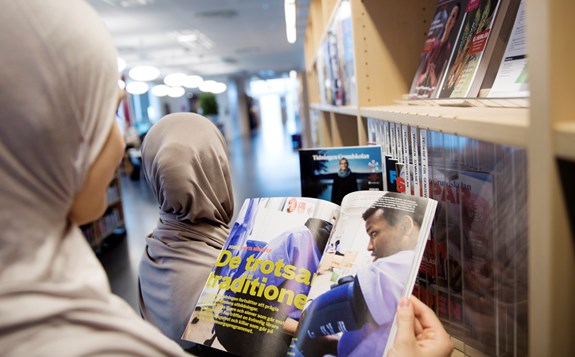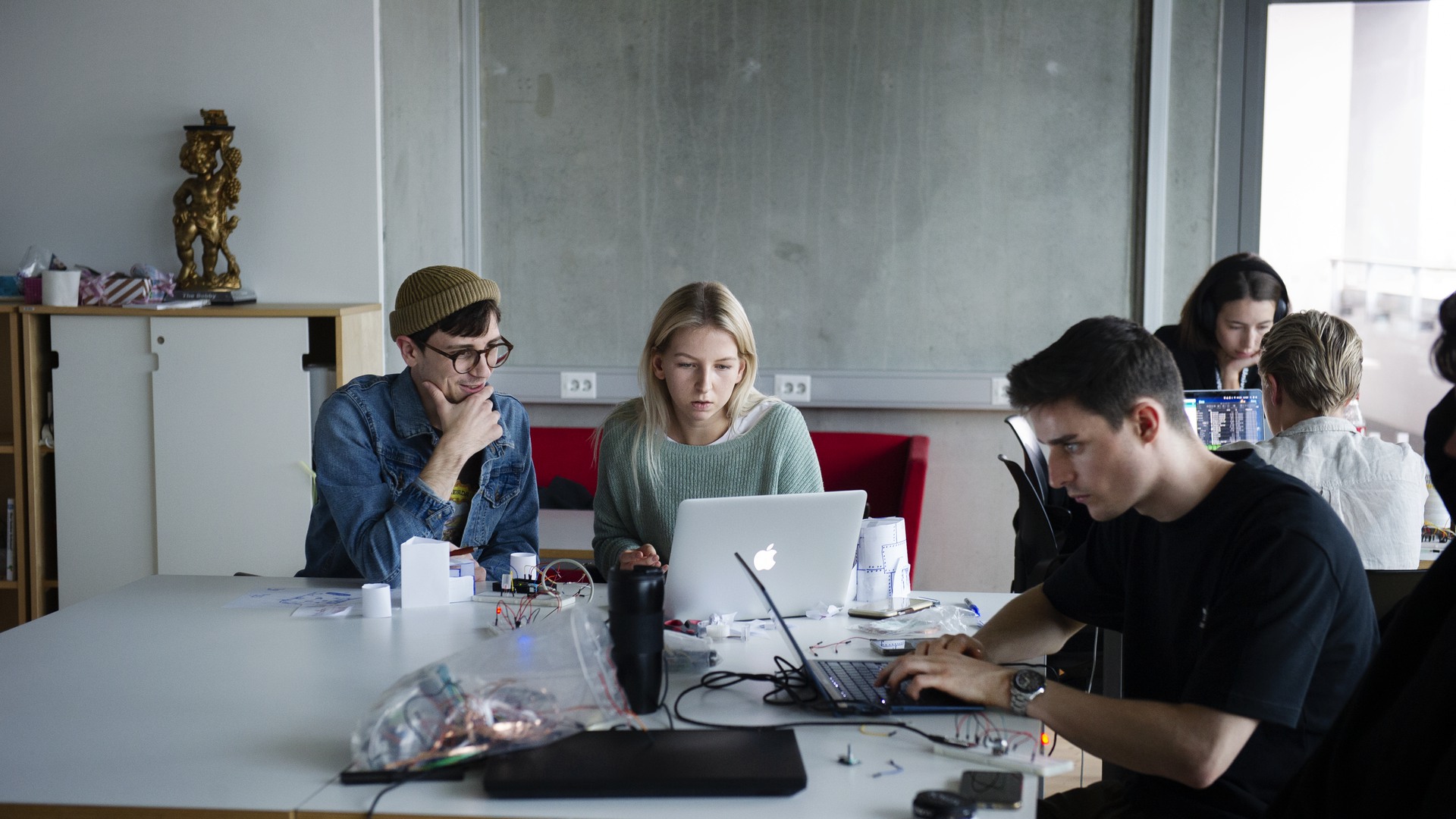Communication for Development
Information film about the programme
https://youtube.com/embed/wEY9BKZEjgk?enablejsapi=1&rel=0&showinfo=1&controls=1
About the education
This programme gives you the skills to work with media and communication in international developmental cooperation as well as in other areas.
This is a half-time study programme, combining courses on culture, communication and development and integrating them with practical field work. It explores the use of communication - both as a tool and as a way of expressing processes of social change - within the contexts of globalisation.
The form of study is unique, comprising a combination of live seminars and web-based communication. The seminars (2 days) are compulsory and consist of lectures, discussions and workshops. Overseas students who cannot physically attend can follow the seminars online. In between the seminars, the students carry out assignments individually and in groups.
Communication for Development starts with new students every autumn semester. In the first year, students receive a comprehensive overview of globalisation and a systematic inventory of the entire field. In the second year, students follow specialised courses which end with an independent project concentrated on one of the field's sub-areas.
Future employment opportunities include work for professional media companies, international organisations (governmental and non-governmental) and PhD studies.
Communication for Development (ComDev) is an interdisciplinary field combining studies on culture, media, communication and development. ComDev explores communication within contexts of articulating global and local processes of social change.
The ComDev field is part science, part craft and part art, and its multidisciplinary academic foundations draw on aspects of development studies, anthropology, sociology and cultural studies. These multiple entry points create a rich framework for challenging hegemonic notions and knowledge, and engage with questions of social, cultural, economic and political power. The theory and practices of ComDev play an important role as witness to global injustice and marginalisation, as amplifiers of dissent and as connectors between people, cultures and stories.
ComDev is taught as a 50% full-time course that distributes 60 credits over four semesters. Our part-time approach is an ideal format for professionals already working in the field, to complement internships or part-time work, as well as for those on sabbaticals or parental leave.
The core courses of the first year triangulate concepts of international development by engaging with keywords such as globalisation, culture, participation or mediatisation.
Virtual group work, short review assignments as well as longer essays and presentations help students to progress through the course, connect with their peers and explore different activity-based learning formats.
Individual feedback from the ComDev team as well as longer teaching seminars and workshops round off the classroom experience for students.
The second year comprises a hands-on, blog-based ICT4D module, a research methodology course and a thesis course. ComDev encourages students to conduct empirical fieldwork, reflect on their own practice and explore alternative formats to complement their MA degree projects.
In short, ComDev fosters teamwork and facilitates the exchange of knowledge and diverse perspectives among students.
It is also possible to add another year of full-time studies to the core, two year, part-time degree by doing courses on communication planning, an optional internship and an extended thesis production project.
ComDev has been successful in bridging the gap between traditional internet-based learning (often called ‘distance learning’) and conventional forms of education on campus. Our convergence pedagogy creates a glocal classroom — a global learning space grounded in local realties. Based in Malmö, our glocal classroom has travelled to partner universities, conferences and seminars in more than twenty countries. Seminars with local alumni, development organisations and our academic network usually take place once a year.
The programme’s alumni quite literally work on all continents and in a variety of capacities: in the aid industry nationally and internationally, in embassies, United Nations organisations and NGOs. In the spirit of ComDev, they interpret communication for development broadly and work in many capacities to advance positive social change — from social enterprises in The Gambia to local and regional government organisations in Sweden. Graduates from the programme also go on to successfully complete doctoral studies.
Entry requirements and selection
Here you can find the entry requirements, as well as how the available study places are distributed between applicants in the selection.
If you have any questions about general admission, you are welcome to contact us.
Entry requirements
Bachelor's degree or equivalent.
The equivalent of Swedish secondary school English 6.
Selection
Academic credits 20%, Letter of intent/Experience document 80%
Note
There are specific instructions regarding eligibility or selection on the next field on this page, called Selection. Please, make sure that you read the instructions thoroughly!
Apply with supporting documents
You are recommended to submit supporting documents to increase your chances of being offered a place in this programme. 80 percent of the study places are offered to applicants who submit supporting documents.
To complete your application, follow the steps below:
- Create an account and apply to the programme no later than 15 April via universityadmissions.se.
- Submit documented proof of your Bachelor’s degree and proficiency in English. Upload the documentation as a PDF at universityadmissions.se, or send it by post. You can apply if you are in your final year and will receive your Bachelor’s degree before the programme starts, by following specific instructions.
- Submit your supporting documents via the form on this webpage. When you have completed the form and pressed “send”, you have submitted your supporting documents. Please make sure to do this after you have completed step one and two. If you apply in multiple admission rounds, you must upload supporting documents for each round.
Supporting documents deadline
Submit the supporting documents no later than 1 February, 23.59 Central European Time (GMT +1), when applying in the international admission round, 16 October–15 January.
Submit the supporting documents no later than 3 May, 23.59 Central European Time (GMT +1), when applying in the national admission round, 15 March – 15 April.
Supporting documents submitted after deadline will not be accepted. Only supporting documents submitted via the form will be reviewed
Supporting documents Communication for Development
Description and assessment matrix for Communication for development (60 credits).
Kerstin found a more profound understanding of global development
Kerstin Gossé from Sweden was educated as a journalist, and worked as a news reporter for press and television before joining the Communication for Development Programme at Malmö University as assistant lecturer. Her experience at ComDev equipped her for her next position as a communications...
Kerstin found a more profound understanding of global development
Kerstin Gossé from Sweden was educated as a journalist, and worked as a news reporter for press and television before joining the Communication for Development Programme at Malmö University as assistant lecturer. Her experience at ComDev equipped her for her next position as a communications specialist at the United Nations Development Programme in Burkina Faso. Kerstin presently works with strategic communication for the City of Malmö in Sweden.
ComDev was the perfect way to combine my skills in journalism and communication with international and development issues. The programme provided me with a more profound understanding of global development issues from social and cultural perspectives and gave me a more hands-on knowledge of how communication can be used as a tool to empower people to take responsibility for their own future and development.
"The web-based learning platform was a great tool for collaboration, networking and exchange with fellow students all over the world, which was professionally enriching and personally very inspiring. The many social challenges addressed at my department at Malmö Stad prove that communication for development and social change is just as relevant in the industrial world as the one we call 'developing'. Lots of things need to be improved, and communication plays a key role in the efforts to improve the lives of people living in the margins of the modern, multicultural welfare state of Sweden."
Jason received a grant to investigate the struggles of social inclusion
Originally from America, Jason Hallman worked with public arts management in California and in the education department of the United States Holocaust Memorial Museum before being hired as a commissioning editor for an independent scholarly publishing company in the U.S.
Jason received a grant to investigate the struggles of social inclusion
Originally from America, Jason Hallman worked with public arts management in California and in the education department of the United States Holocaust Memorial Museum before being hired as a commissioning editor for an independent scholarly publishing company in the U.S.
He has been living in Johannesburg, South Africa since 2009, where he consults with local and international NGOs on community media, knowledge management and participatory processes.
"In addition to allowing me to become conversant with sophisticated contemporary debates about the future of development, I also really appreciate my fieldwork experience.
"For my final project, I received a generous grant from the City of Malmö, which enabled me to work with participatory media and storytelling as means to better understand the struggles of social inclusion among marginalised youth in Sweden. I am continuing to explore how my ComDev education will inform my ‘real world’ practice, but in my brief time in South Africa, I have been able to see the direct benefits of both my coursework and my final project. Even though the programme was not entirely practical in nature, its emphasis on important debates around the theorisation of culture, discourse, and development itself has given me a very useful orientation."





